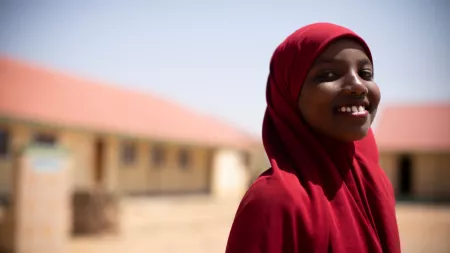The Somali Girls’ Education Promotion Programme – Transition (SOMGEP-T), funded by FCDO’s Girls’ Education Challenge and USAID, was implemented by CARE in Northern-Central Somalia in 2017-2022. SOMGEP-T sought to improve learning outcomes and positive transitions for more than 27,000 girls and 24,000 boys already in school, and over 5,000 out-of-school marginalized girls living in remote and rural areas.
Many of SOMGEP-T participants come from pastoralist households acutely affected by the climate crisis. During SOMGEP-T’s implementation, those households faced two major droughts and locust swarms, in addition to the COVID-19 crisis and conflict. To respond to their unique needs, SOMGEP-T worked with Ministries of Education in Somaliland, Puntland, and Galmudug to deliver an integrated intervention rooted on social norms change, including training teachers and school management; social-emotional skills development; providing flexible learning opportunities for pastoralists; and strengthening households’ financial capacity. SOMGEP-T worked in 148 primary and 51 secondary schools, collaborating with the Ministries of Education to support Community Education Committees, religious leaders, mothers, and individual students.

Five years later, what happened to the girls?
A longitudinal cohort study of the SOMGEP-T girls showed that five years later, women who had participated in the project were 5.8 percentage points less likely to be married before the age of 15, in relation to a comparison group with similar socio-economic characteristics. SOMGEP-T girls married 1.4 years later, at a typical age of 18.3 years, compared to 16.9 years among the comparison group. SOMGEP-T women were also 6.7 percentage points more likely to be employed than those in the comparison group.
Former SOMGEP-T participants are also less likely to accept gender-based violence as a norm. Only 13.5% of the married SOMGEP women agreed that a husband can beat a wife who neglected household duties, compared to 30.5% of the comparison group.

How did we get there?
To develop girls’ agency and build supportive relationships, SOMGEP-T set up Girls’ Empowerment Forums (GEF), where vulnerable adolescent girls were supported by a female community mentor to develop leadership skills; plan and execute girl-led actions; and connect with resource persons and services in their location. To strengthen systemic capacity to support girls’ education, SOMGEP-T co-designed the GEF approach with state Ministries of Education Gender Focal Points, who trained GEF mentors and coached them on an ongoing basis at their schools.
The results show that girls’ participation in GEFs was instrumental to develop their social-emotional skills, boost participation in class, and expand their aspirations, vision for the future, and social networks. These gains have translated into a major increase in attendance - a seven percentage point difference over and above the comparison group. Their average learning score also increased sharply: within two years, GEF participants had a gain of 16 percentage points over and above the comparison group.
In parallel, CARE also mobilized the girls’ mothers to form Village, Savings, and Loans Associations (VSLAs). The VSLAs helped to boost household financial capacity, while also serving as a platform to shift social and gender norms affecting girls’ attendance and retention in school. Girls from households that participated in VSLAs had a 3.1-point increase in English literacy scores, over and above the comparison group, and an overall increase of 1.8-point in their aggregated learning score.

What did we learn?
The development of girls’ social-emotional skills turned out to be a game changer, not only boosting their attendance and learning outcomes, but also contributing in the medium term to changes in attitudes and practices toward marriage, economic empowerment, and decision-making. The results illustrate the importance of investing in girls’ ‘soft skills’ in parallel with academic interventions on teacher training and school management.
Where do we go next?
The lessons learned from SOMGEP-T were leveraged in the design of the ongoing Adolescent Girls’ Education in Somalia (AGES) project, funded by FCDO and USAID. Implemented in conflict-affected areas of South Somalia, AGES is an ambitious six-year initiative (2018-2024) supporting 86,334 ultra-marginalized girls and female youth to access quality education responsive to their needs. The evidence emerging from SOMGEP-T is also informing education sector planning and system strengthening interventions across Somalia, through ongoing partnerships between Ministries of Education, CARE, and other development partners.
